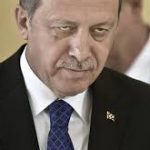From Syria to Libya to Palestine, Erdogan is staking Turkey’s claim to be a power player in the Middle East – by turning unmitigated losses into strategic wins
One might be forgiven for thinking that Turkey’s recent attempts to go it alone in international military adventures, from Syria to Libya, have been an unmitigated disaster.
In those conflicts, Turkey is either supporting a losing side, or contributing to a stalemate. However, Ankara’s priority in Syria and elsewhere is not necessarily to back a winner. Its aim, is to carve a stake in its near abroad, and to ensure that other powers sufficiently recognize Turkish interests.
In Syria, following the recent advances of Bashar Assad’s forces in Idlib, which along with many civilian casualties left 13 Turkish soldiers dead, Turkey’s firebrand president Recep Tayyip Erdogan demanded that Syrian troops withdraw or face severe retaliation. Ankara has already sent additional forces, equipment and supplies to the front lines.
Ankara also publicly rejected Moscow’s claim that Turkey flouted the de-escalation agreements forged between the two countries and Iran back in 2018. Last week, U.S. envoy James Jeffrey tried to use the Russian-Turkish rift to recalibrate U.S.-Turkish relations by describing the dead Turkish soldiers as “martyrs” and vowed that Washington would stand by its NATO ally. But despite mollifying American words, Turkey is in no rush to return to the Western fold, and remains determined to chart its own path.
In Idlib, for example, Ankara’s position appears untenable. The Turkish-backed opposition forces stand little chance against the superior firepower of the Assad regime -which, supported by Russia, controls the region’s airspace and has made steady advances across the country. Yet Turkey perseveres with a doomed policy of supporting a ragtag band of opposition forces.

However, by holding onto Idlib, Ankara has a its interests recognized by international powers and has a central place in forums which discuss the future of Syria – and avoids, for now, another influx of Syrian refugees, Just the fact that Erdogan and Russian President Vladimir Putin speak regularly, and that last week Moscow sent a delegation to Turkey to discuss the situation and this week additional talks are being held in Moscow, is a boon for Ankara. Later on, Turkey can use Idlib as a bargaining chip to secure its interests in other areas of Syria, especially Kurdish territory alongside its border.
Similarly, in Libya, Turkey has sent equipment, weaponry and members of its Syrian proxy forces, some of them radical jihadists, to support the Tripoli-based Government of National Accord led by Fayez al-Sarraj. However, even if the Tripoli government survives, all that can be achieved is a stalemate. The opposing forces of General Khalifa Haftar control most of the country, and Haftar enjoys the support of Russia, France, the UAE, Egypt and other countries in the region.
By: Simon A. Waldman
Source: Hareetz



